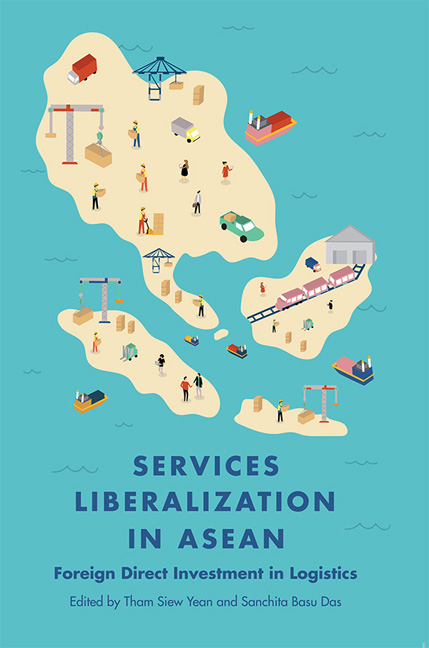Book contents
- Frontmatter
- CONTENTS
- List of Tables
- List of Figures
- Foreword
- Preface
- Acknowledgements
- Abbreviations
- About the Contributors
- 1 Introduction
- 2 Reforming Indonesia's Logistics Sector
- 3 FDI Liberalization in Malaysia's Logistics Services
- 4 Logistics Services Liberalization in the Philippines
- 5 Services Sector Liberalization in Singapore: Case of the Logistics Sector
- 6 Logistics Services Liberalization in Thailand
- 7 Services Liberalization in Vietnam: The Case of FDI in Logistics Sector
- 8 Services Liberalization: Case of Logistics in Brunei
- 9 FDI, Services Liberalization and Logistics Development in Cambodia
- 10 Services Liberalization in Lao PDR: FDI in Logistics Sector of a Land-linked Country
- 11 Facilitating FDI for the Logistics Sector in Myanmar: Agency, Incentives, and Institutions
- Index
4 - Logistics Services Liberalization in the Philippines
Published online by Cambridge University Press: 04 July 2018
- Frontmatter
- CONTENTS
- List of Tables
- List of Figures
- Foreword
- Preface
- Acknowledgements
- Abbreviations
- About the Contributors
- 1 Introduction
- 2 Reforming Indonesia's Logistics Sector
- 3 FDI Liberalization in Malaysia's Logistics Services
- 4 Logistics Services Liberalization in the Philippines
- 5 Services Sector Liberalization in Singapore: Case of the Logistics Sector
- 6 Logistics Services Liberalization in Thailand
- 7 Services Liberalization in Vietnam: The Case of FDI in Logistics Sector
- 8 Services Liberalization: Case of Logistics in Brunei
- 9 FDI, Services Liberalization and Logistics Development in Cambodia
- 10 Services Liberalization in Lao PDR: FDI in Logistics Sector of a Land-linked Country
- 11 Facilitating FDI for the Logistics Sector in Myanmar: Agency, Incentives, and Institutions
- Index
Summary
Introduction
Services now account for a significant share of output and employment in the Philippines. It has become a major growth driver for the Philippine economy with rising growth rates in transportation, communication, storage, finance and IT-business process management. Together with a resurgent domestic manufacturing it is expected to continue to propel growth in the immediate term. The liberalization of the services sector will be important in order to bring in foreign direct investment (FDI) that will further strengthen its growth prospects. The logistics services comprise an important part of the service economy. This chapter examines the liberalization of the services sector, domestic regulatory reform and inflows of FDI to the logistics services. Liberalization is expected to lead to an infusion of capital, expertise, modern technology, and to expand market opportunities through FDI.
The chapter is structured as follows: after a brief introduction, Section 2 provides an overview of the services sector with a focus on maritime transport industry and freight forwarding services, which have the biggest share of the logistics industry. Data availability drives the discussion to these two components of the logistics sector. Section 3 reviews the policy measures for the development of the logistics services industry. The policy measures cover: (i) domestic policies and incentives, (ii) regulations, and (iii) unilateral, regional, as well as multilateral liberalization measures under ASEAN Framework Agreement on Services (AFAS) and General Agreement of Trade in Services (GATS). Section 4 discusses the overall enabling environment and inflows of FDI to the economy and, data permitting, the logistics sector. Section 5 identifies outstanding challenges and policy suggestions.
Gonzalez (2014) points out two aspects of the rise of services: first, because of improvements in information and communications technology (ICT), services have become more and more tradable, and second, domestically produced services serve as vital inputs to the production and trade of goods and services. Services are used and traded along with inputs into other economic activities, with both playing a key role in a country's competitiveness and participation in global value chains (GVCs) (Hollweg et al. 2014).
- Type
- Chapter
- Information
- Services Liberalization in ASEANForeign Direct Investment in Logistics, pp. 110 - 147Publisher: ISEAS–Yusof Ishak InstitutePrint publication year: 2017

